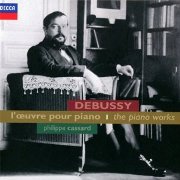First released on the French Auvidis label in the early 1990s, Philippe Cassard’s Debussy piano music cycle returns to the catalog as a budget-priced boxed-set from Decca. Cassard utilizes a well-preserved 1898 Bechstein, whose warm sonority, clear registral differentiation, and slightly metallic yet gentle tonal residue to the high notes unquestionably contribute a unique patina to the performances.
The timbres do not reflect Debussy’s “piano without hammers” paradigm so much as they evoke a wide array of mallets. You especially notice this in rapid note groupings such as the murmuring ostinatos throughout the third Book One Prélude (Le Vent Dans La Plaine) and Book Two’s concluding Feux d’artifice, L’Isle joyeuse’s chains of trills, or the Seventh Etude’s chromatic runs. These passages tend to sound suave and uniform in the best modern concert grand performances; here the articulations and sonorities are quite varied and distinct.
As an interpreter, Cassard hits and misses. Some of the Préludes don’t live up to their characterful potential, like the overly loud and slightly square Des pas sur la neige, the heavy-footed Hommage à Samuel Pickwick Esquire, or the fussy and fidgety Les collines d’Anacapri and Minstrels. By contrast, La sérénade interrompue’s petulant accents and dynamic surges carry an appropriate cutting edge, while Cassard’s long-lined intimacy yields subtle rewards in La Fille aux cheveux de lin and Bruyères.
In Images Book One, Cassard observes Mouvement’s accents and dynamic indications a little too casually, and is too earthbound in pieces requiring lightness and animation, like Suite bergamasque’s Passepied, the Children’s Corner’s Doctor Gradus ad Parnassum, and an uncomfortably stiff Danse. However, introspective selections like the Sarabande (Pour le piano), Nocturne, and Reverie stand out for Cassard’s sensitivity and refinement.
Incidentally, Cassard recorded two recently discovered unpublished pieces specifically for this re-release, on a standard Steinway grand: Pour le Vêtement du blessè (1915) and Les soirs illuminés par l’ardeur du charbon (1917). To sum up, the best of Cassard’s efforts makes this release worthwhile, but collectors seeking a modern-day Debussy cycle first should consider Planès, Fergus-Thompson, or Bavouzet.
































